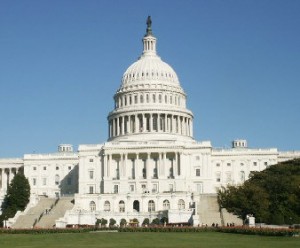 Last summer, the American people learned that the only way their Congress could overcome ideological and partisan divisions and agree to a balanced deficit reduction plan was by threatening itself with a deficit reduction plan so severe members of Congress on both sides of the aisle would gladly accept an alternative plan.
Last summer, the American people learned that the only way their Congress could overcome ideological and partisan divisions and agree to a balanced deficit reduction plan was by threatening itself with a deficit reduction plan so severe members of Congress on both sides of the aisle would gladly accept an alternative plan.
We then learned that even under these circumstances, our Congress could not pass a balanced deficit reduction plan. With the looming sequestration, the technical term for that threat Congress imposed on itself, I thought it would be useful to reflect on the events of last summer and where things stand now.
First, a recap of last summer is in order. Spurred primarily by Tea Party Republican members of Congress, who refused to approve a routine increase of the debt ceiling without the Democrats agreeing to significant reductions in government spending, the United States Congress and the President entered into an intense end-of-session game of chicken as the clock ticked down. If Congress did not raise the debt ceiling, the government of theUnited States of Americawould default on its debt.
Initially, President Obama requested a clean vote to raise the debt ceiling without any spending cuts attached. When this vote failed at the end of May, Democrats began to realize that perhaps as a result of the 2010 midterm elections which brought a new breed of Republican toWashington, Republicans in Congress were serious in their political brinksmanship. The Republicans were serious when they said they would not raise the debt ceiling without tackling the deficit. If the credit rating was downgraded, so be it.
There were several high-profile attempts made to reach an agreement on deficit reduction that would satisfy the Republicans enough for them to grant us all the privilege of not having our credit rating downgraded. Vice President Biden entered into negotiations with House Majority Leader Eric Cantor and Senate Minority Whip Jon Kyl, who walked out of negotiations by the end of June citing their opposition to the Democrats’ insistence on “job-killing tax hikes.”
Seeking what was labeled a “grand bargain,” President Obama advocated the passage of a $4 trillion deficit reduction plan that included both spending cuts and new revenue. For a brief moment, it seemed the President had convinced Speaker Boehner to agree to the plan.
If the President had gotten his grand bargain, he would have scored a major political victory. The grand bargain would have allowed him to claim the mantle of a uniter and a deficit hawk, which would appeal to those valuable independent voters. But Speaker Boehner and the Republicans were not about to give Obama a political victory of this magnitude. However, partisanship and divisions between the parties do not offer a complete explanation for why President Obama was unable to reach a grand bargain. Divisions within the Republican Party, particularly between the more old guard Republicans and the Tea Party Republicans who were swept into office in 2010, made such a grand bargain politically infeasible for Boehner. As Speaker of a House with many Republican freshmen who won their elections by vowing to serve as a bulwark against government spending and taxes, embracing the grand bargain would have undermined his reputation and credibility within that faction of his caucus. Moreover, he probably would not have been able to corral the necessary votes for its passage, which itself would be an embarrassment for the newly elected Speaker.
The House of Representatives, led by Speaker Boehner, passed the Republican-approved Cut, Cap, and Balance Act which would have authorized an increase in the debt ceiling only after a Balanced Budget Amendment was passed by Congress. Just as this partisan bill failed in the Senate, Reid’s plan passed through the Senate but was rejected by the House. Meanwhile, the Gang of Six tried and failed to come up with a solution.
Finally, at the end of July President Obama announced an agreement between his administration and congressional leaders. There would be $917 billion in spending cuts and deficit reduction coupled with a $900 billion increase in the debt ceiling in the first stage. For Standard & Poor’s, this was too little too late, and the agency downgraded the U.S.credit rating for the first time. In the second stage, a special joint committee of Congress would be tasked with finding another $1.5 trillion in deficit reduction by the end of November. If this Super Committee failed, across-the-board spending cuts totaling $1.2 trillion and split between defense and nondefense programs would be triggered. The sequestration was intended to provide an incentive for the Super Committee to reach an agreement. On January 15th, 2012, the deadline had arrived, the Super Committee had not reached an agreement, and the automatic cuts were triggered.
The $1.2 trillion in automatic cuts are set to go into effect in January 2013. The first round of the defense cuts, totaling $109 billion, will go into effect on January 2nd. While Republicans criticize the President and his Democratic allies of playing politics with the defense budget, many Democrats have suggested that the Republicans brought these defense cuts upon themselves. Sequestration is no way to make policy. The Founders envisioned a legislative branch of government that was deliberative and reached conclusions on matters of policy through consensus building and compromise. The Democrats were willing to go to great lengths to reach a compromise, with the President even putting Medicare and Social Security cuts on the table. Republicans took defense cuts and tax increases off the table. It was under these dire circumstances that sequestration was employed, and I think it was justified by these circumstances.
The ultimate test of the wisdom of a political tactic is whether that tactic achieved the desired results. It is not completely clear what President Obama and his allies in Congress hoped to get out of the sequestration. This ambiguity is particularly apparent with respect to the defense cuts.While the President’s own Secretary of Defense has likened the automatic defense cuts to shooting ourselves in the head, the President has not said much about the cuts himself. So where do the President and his party stand on the issue?
The President recently announced that military personnel would be protected from the automatic cuts, but has dismissed Republican demands that he exclude other defense cuts from the sequestration. While his administration sounds the alarm about how devastating the defense cuts would be and continues to push Congress to reach a balanced agreement that would avoid the cuts, the President and his allies in Congress do not appear to be going out of their way to avoid them. Republican leaders in Congress have requested that Senator Reid pass a package of alternative spending cuts in order to avoid the automatic defense cuts. Disagreements over taxes, of course, continue to prevent the two parties from agreeing on an alternative package.
President Obama has discussed his vision for a “leaner” military and a light footprint strategy. We have seen the strategy used effectively inLibya. A new Obama campaign television advertisement criticizes Romney for favoring increases in defense spending, among other things. He may not say it outright, but it does not seem like President Obama is strongly opposed to these defense cuts.
With the sequestration, President Obama essentially forced the Republicans to choose between increases in tax revenue and cuts in defense spending. The Republicans hated both options, but between Grover Norquist’s no tax pledge and the Tea Party, the Republicans had their backs up against the wall. A significant number of Republicans in Congress had won their seats in 2010 after promising not to raise taxes and to go toWashingtonas soldiers in the war against government spending. I think a number of Republicans may have believed that the defense cuts were so severe that members of both parties would eventually reach some agreement to exclude them from the sequestration. Believing or hoping that the sequestration was an empty threat, Republicans refused to raise taxes and accepted the risk of sequestration. Raising taxes would have had definite political consequences whereas the political consequences of the defense cuts were deemed to be only hypothetical.
Despite Republicans consistently making defense spending a sacred cow that must be off the table in any discussion of spending cuts, dramatic defense cuts are imminent. If it was their aim to cut defense spending, and it seems like it was in fact their aim, then it can be said that President Obama and his allies in Congress successfully employed a shrewd political tactic to achieve the results they desired.
What is now called the Department of Defense was once called the Department of War. The wars inAfghanistanandIraqwere not defensive wars. NeitherIraqnorAfghanistanattacked theUnited States. NeitherIraqnorAfghanistanposed an existential threat to theUnited States. President Bush and his administration tried their hardest to convince us otherwise. Such a broad conception of defense has led to misguided wars and excessive military spending. Today, those who favor a leaner military and anAmericathat truly walks softly and carries a big stick are on the verge of making some progress. Unfortunately, it took the messy politics of sequestration to make this happen.
 For sixteen years the Flickers: Rhode Island International Film Festival has been bringing independent short- and feature-length filmmaking to Rhode Island moviegoers. As part of the festival this year, Flickers is bringing back the Film Forum, a one-day symposium on Thursday that will discuss how to sustain and grow independent, local filmmaking—and filmgoing—in the Ocean State.
For sixteen years the Flickers: Rhode Island International Film Festival has been bringing independent short- and feature-length filmmaking to Rhode Island moviegoers. As part of the festival this year, Flickers is bringing back the Film Forum, a one-day symposium on Thursday that will discuss how to sustain and grow independent, local filmmaking—and filmgoing—in the Ocean State.






